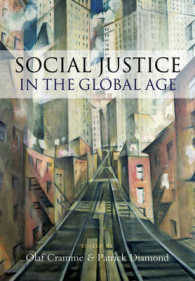- ホーム
- > 洋書
- > 英文書
- > Business / Economics
Full Description
One of the predominant trends of modern society is the pervasive presence of competition. No longer just a function of economic markets or democratic systems, competition has become a favoured tool for governing people and organizations, from the provision of schooling and elder care to the way we consume popular culture. Yet social scientists have played a surprisingly modest role in analysing its implications, as the discussion of competition has largely been confined to its narrow economic meaning.
This book opens up competition for the study of social scientists. Its central message is that while competition seems ubiquitous, it should not be taken for granted or be naturalized as an inevitable aspect of human existence. Its emergence, maintenance, and change are based on institutions and organizational efforts, and a central challenge for social science is to learn more about these processes and their outcomes.
With the use of a novel definition of competition, more fundamental questions can be addressed than merely whether or not competition works. How is competition constructed - and by whom? Which behaviours result from competition? What are its consequences? Can competition be removed? And, how do these factors vary with the object of competition - be it money, attention, status, or other scarce and desired objects? This book investigates these and more questions in studies of competition among and within schools, universities, multinational corporations, auditors, waste-disposal firms, fashion designers, and more.
Contents
1: Stefan Arora-Jonsson, Nils Brunsson, and Raimund Hasse: A New Understanding of Competition
2: Daniel Sands, Gino Cattani, Joseph Porac, and Jason Greenberg: Competition as Sensemaking
3: Patrik Aspers: Competition by Mutual Adjustment
4: Stefan Arora-Jonsson, Nils Brunsson, and Raimund Hasse: The Origins of Competition: Institution and Organization
5: Niklas Bomark, Peter Edlund, and Stefan Arora-Jonsson: Convincing Others That They are Competing: The Case of Schools
6: Nils Brunsson and Linda Wedlin: Constructing Competition for Status: Sports and Higher Education
7: Nadine Arnold: Avoiding Competition: The Effects of Rankings in the Food Waste Field
8: Karin Brunsson and Katarina Rahnert: Competition and Auditing: Esteemed but Incompatible Ideas
9: Michael Scroggins and Daniel Souleles: The Allure of Prizes: How Contests Trap Us in Competitive Relationships
10: Søren Christensen and Hanne Knudsen: The Organization of Competition and Non-Competition in Schools
11: Katarina Lagerström, Emilene Leite, Roger Schweizer, and Cecilia Pahlberg: Cooperating While Competing: The Case of Multinational Corporations
12: Fabien Foureault: Reversing Competition: The Case of Corporate Governance
13: Sebastian Kohl and Abraham Sapién: Debunking the Holy Trinity: Competition, Individualism, and Meritocracy
14: Stefan Arora-Jonsson, Nils Brunsson, Raimund Hasse & Katarina Lagerström: Competition Unbundled: Taking Stock and Looking Forward








